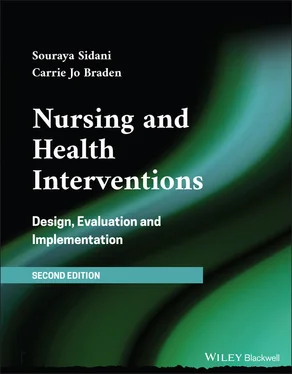Library of Congress Cataloging-in-Publication Data
Names: Sidani, Souraya, author. | Braden, Carrie Jo, 1944– author.
Title: Nursing and health interventions : design, evaluation and implementation / Souraya Sidani, Carrie Jo Braden.
Other titles: Design, evaluation, and translation of nursing interventions
Description: Second edition. | Hoboken, NJ : Wiley-Blackwell, 2021. | Preceded by Design, evaluation, and translation of nursing interventions / Souraya Sidani, Carrie Jo Braden. 2011. | Includes bibliographical references and index.
Identifiers: LCCN 2021013467 (print) | LCCN 2021013468 (ebook) | ISBN 9781119610120 (paperback) | ISBN 9781119610137 (adobe pdf) | ISBN 9781119610090 (epub)
Subjects: MESH: Nursing Care | Evaluation Studies as Topic | Nursing Research | Research Design | Translational Medical Research
Classification: LCC RT81.5 (print) | LCC RT81.5 (ebook) | NLM WY 100.1 | DDC 610.73072–dc23
LC record available at https://lccn.loc.gov/2021013467LC ebook record available at https://lccn.loc.gov/2021013468
Cover Design: Wiley
Cover Image: © Alexkich/iStock/Getty Images
Interventions constitute the essence of nursing and health care. To be successful in promoting health and well‐being, health interventions have to be carefully designed, delivered, and evaluated, before they are implemented in practice.
Over the past decades, advances in intervention research generated a range of designs, methods, and procedures for developing, providing, and determining the effectiveness of health interventions. The advances were motivated by cumulating evidence pointing to limitations in traditional approaches to intervention research, by the widening recognition of the value of client‐centered care, and by the increasing demand for interventions that are acceptable and adaptable to practice and for evidence that is relevant and meaningful in informing treatment decisions in practice. Practice‐relevant evidence indicates: what clients, presenting with which personal and health characteristics, benefit, to what extent, from what health intervention, provided in what mode or format and what dose, in what context, as well as how health interventions work in producing the beneficial outcomes that are of importance to clients.
Advances in intervention research have been described in a multitude of sources spanning different disciplines and professions, and often using different terminology. This book is intended to serve as a helpful “one‐stop” resource for researchers and health professionals planning to engage in intervention research. The book is divided into five sections. The first section provides an overview of the conditions that instigated the advances, and of the systematic process for designing and evaluating health interventions. The second section presents approaches for developing new interventions that culminate in the generation of the intervention theory. The central role of the theory in guiding the planning and conduct of intervention delivery and evaluation is clarified. The third section details approaches and methods for delivering the intervention with fidelity and flexibility. The fourth section describes traditional and alternative research designs, methods, and procedures for evaluating the interventions’ acceptance, feasibility, process, and outcomes. The fifth section provides an overview of initiatives aimed at implementing evidence‐based interventions in practice.
The content of the book covers conceptual, empirical, and practical knowledge needed for the optimal design, delivery, evaluation, and implementation of health interventions. The conceptual knowledge clarifies the rationale or the “why” of the approaches and methods for designing and evaluating interventions; it explains the principles and logic underlying them and discusses their strengths and limitations. Empirical knowledge supports the utility of the approaches and methods by providing evidence on their strengths and limitations. The conceptual and empirical knowledge are combined to justify methodological decisions in intervention research. Practical knowledge describes the “what” and “how” of the approaches and methods; it provides guidance for applying them.
The goal is to support students, researchers, and health professionals in making appropriate decisions in:
1 Selecting the optimal approaches and methods for designing, delivering, evaluating, and implementing health interventions.
2 Generating evidence that informs treatment decisions in practice.
3 Promoting the adoption, adaptation, and implementation of intervention in practice, which ultimately lead to the provision of high‐quality, client‐centered, healthcare.
The authors gratefully acknowledge the informal feedback from colleagues, the constant challenge of students, and the instrumental support of staff (at the Health Intervention Research Center), which contributed to the refinement of our thinking and continuous expansion and evaluation of their conceptual and methodological knowledge.
This work could not be accomplished without the love, encouragement, and unlimited support of their family (in particular Cara Ager and Leila Sidani) and mentors.
This work was partially supported by the Canada Research Chairs Program.
SECTION I INTRODUCTION
CHAPTER 1 Introduction to Intervention Research
Clients experience health problems and seek assistance from health professionals to address these problems. Health professionals are responsible for providing high‐quality healthcare that successfully manages the clients' problems and promotes their well‐being. Specifically, health professionals are expected to engage with clients in making treatment‐related decisions; provide the selected treatment or intervention; monitor clients' responses to treatment, that is, changes in the experience of the health problems; and adapt the intervention, as needed, to clients' responses. Thus, interventions constitute the central elements of healthcare, and their careful selection and appropriate delivery form the basis of high‐quality care. Sound decision‐making demands that health professionals: are aware of available interventions addressing the health problem with which clients present and of evidence regarding the benefits or effectiveness and the risks or discomfort associated with alternative interventions; inquire about clients' values and preferences; and collaboratively choose the intervention that is beneficial yet consistent with clients' values and preferences. Intervention research is concerned with generating evidence on the benefits and risks of health interventions, to inform treatment decision‐making in practice.
What constitutes empirical evidence that is useful in informing treatment decisions in practice is evolving. With the adoption of evidence‐based practice in the early 1990s, evidence from randomized controlled or clinical trials (RCTs), also known as experimental designs, was admitted as the most reliable or robust evidence of health interventions' benefits; the RCT is believed to have features that enhance the validity of inferences regarding the causal impact of interventions on outcomes (Holm et al., 2017). Consequently, evidence synthesized across RCTs was relied on to generate guidelines that inform decision‐making in practice.
In the past decades, experiences with evidence‐based practice revealed limitations of this approach to healthcare (Horwitz et al., 2017). These limitations, along with increasing societal value and demand for person‐centeredness, are contributing to shifts in perspectives on what constitutes high‐quality healthcare and what methods and strategies are appropriate for the design, delivery, and evaluation of interventions.
Читать дальше












